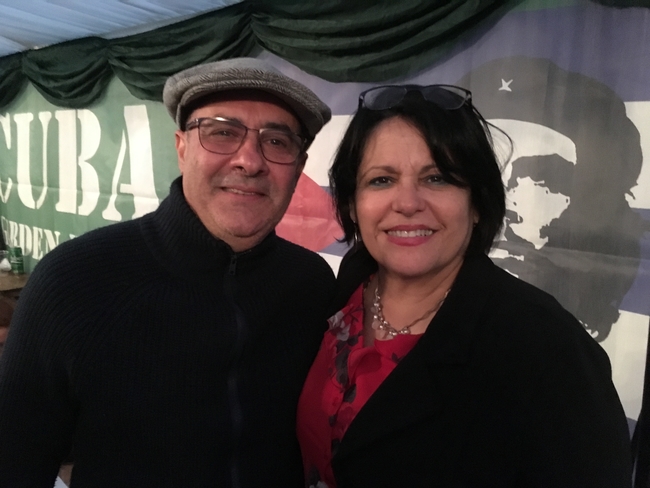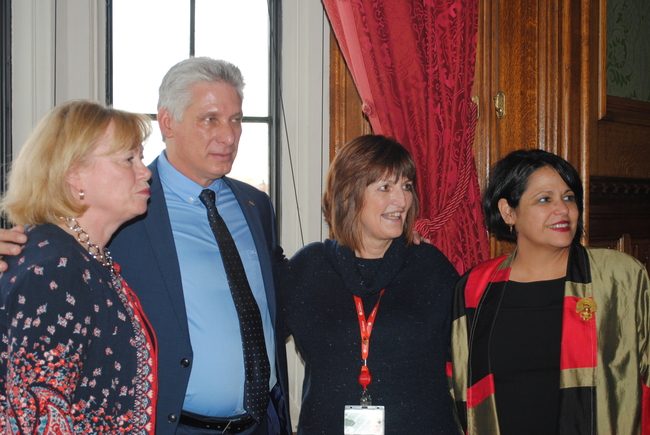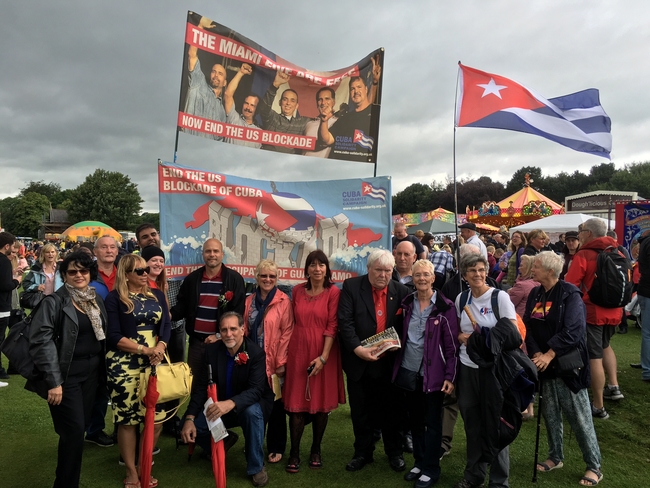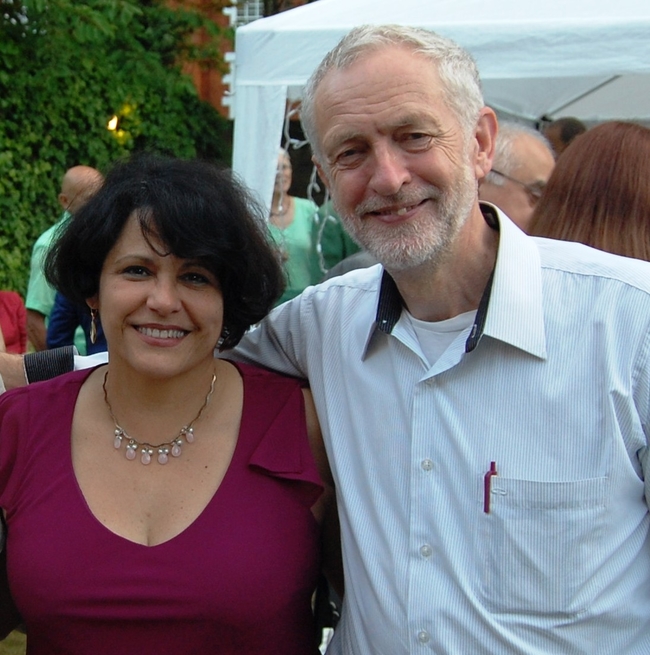Keep supporting Cuba: a farewell message of love and comradeship from the departing Cuban ambassador Teresita Vicente Sotolongo
Campaign News | Friday, 31 January 2020

Teresita and Toni
Back in November 2014, Teresita was not expecting to be posted to the UK. She had recently finished a term as ambassador in Canada, and was working in the Ministry of Foreign Affairs (MINREX) when the call came. Illness had prevented a new ambassador from taking up the post, so she had two weeks’ notice before arriving in the UK to provide temporary cover.
Born in Havana, three years before the Revolution, Teresita considers herself a pioneer of the country’s revolutionary education which at the time combined study and voluntary work. She led a normal life but was always conscious of the Revolution growing up. After school she studied diplomacy at the Higher Institute for International Relations (ISRI) – the same institute where Miami Five hero, Gerardo Hernández, is now dean.
On graduating she went straight into a role at MINREX, before taking diplomatic postings in Finland, Sweden and Denmark, receiving her first ambassadorial role in Switzerland in 2000.
Although Teresita had made only a flying 24-hour transit visit to the UK 1999, she knew a lot about Britain and the work of CSC before arriving. “Before going to Canada, I was European Division Director, so I’d already heard a lot about the UK and the amazing work of CSC for many years before.”
Despite the short notice of her posting in London, she was “happy and excited about the new challenge” when given the news. She’d already heard about the work the campaign had been doing on the Miami Five, and the fact there was an active All-Party Parliamentary Group (APPG) on Cuba, so the prospects for being able to develop good relations looked good, she says.
She describes her experiences of working with parliamentarians and in particular the APPG and Cross-Party Group in Scotland as “marvellous”.
“You brought so many people from different sectors to speak to them: doctors, Che’s daughter Aleida Guevara, Mariela Castro to talk about LGBT+ rights,” although the highlight of all of these exchanges was of course the visit of Cuban President Miguel Díaz-Canel in November 2018.
“The visit was so moving for him. When Baroness Smith spoke to introduce him at the parliamentary reception, the room was full of people from all sides, MPs, Lords, Baronesses. I remember how moved he felt. He said, ‘I knew when I came that Cuba had friends here, but I never imagined there would be so many.’
“In every sense that visit made a permanent mark on bilateral relations between the UK and Cuba. It was the first visit of a Cuban president to Britain. Obviously, 72 hours is not a long time, but we did so many things in this short time, and this link will remain key in our relations in the present and in the future.”

But her work has not constrained her to London. Teresita takes time to list all the cities in England, Scotland and Wales she has visited, and the local group meetings she has spoken at – they are too numerous to list here, but all have left lasting impressions.
“The work of the local groups is really important. They have been able to reach out to local councils and organisations and place Cuba at the centre of discussions about the blockade. I found local government councillors in many places who were aware about Cuba through the work of local groups. They have been promoting visits to Cuba hosting exchanges. This is one of the merits of the Campaign – that you are spread out around the country, not just in London, so you can reach people all over the UK. And local groups have been able to impact at all levels, in universities for example, where they also have links with young people’s organisations and university lecturers. There are links in all sectors.”
For Teresita, her time here and meetings with local groups has been a two-way exchange. She recalled a visit to a hospital in Oxford with mental health professionals where she was able to see how they worked in practice: “I’ve attended a lot of meetings to speak about Cuba, but at the same time Toni (her husband and Embassy Minister Counsellor) and I have learnt a lot about how ordinary people live, about the NHS, and your education system. All the knowledge I’ve gained about life here has enriched my own life and my soul.
“There’s no sense in being in a country for some time without learning about the people there, how they feel, think, their history, the history of trade unions. The labour movement here has such a beautiful history, all the gains you have achieved.”
She has especially enjoyed participating in trade union events in the UK:
“I feel empathy with the trade unions here. I think one of the reasons is an appreciation of the work that they have been doing for years and years in support of Cuba, our right to defend the Revolution, and the symbol of the Miami Five in this struggle. Knowing that Britain was the country that did more and most effectively for the freedom of the Five inspired me a lot.
“But I also saw people so devoted to work for their trade union branches and members. Seeing how people had come to understand Cuba because of the years of exchanges and delegations, the links between Cuban and British unions which made them like a family; their total commitment to openness and to both talk and share their achievements and problems in their lives moves me a lot. I feel inspired when I am with trade unionists.”
Teresita can’t recall a time in the last five years when she turned down a request to speak at a CSC trade union fringe meeting, as she enjoyed doing them so much: “I think I went to every one of them, even when it meant I had to jump on a train and then three hours later I would jump on a train back because I had another event the same evening. But it was and is very inspiring. I will treasure that, and I also treasure the Campaign and all the workers and local group members. Everyone has been so supportive… no, supportive is not the right word… so sweet, and so close to us. It’s been a great experience to be here.”

The visit of Miami Five heroes Rene González and Gerardo Hernández and their families in 2016 was another highlight for Teresita. Recalling the fight for the visas, for which CSC had to take a case to the High Court, she said: “I always believed you would get the visas. You had the energy, knowledge, conviction and the intelligence to do it. I never doubted it. And CSC never doubted it, because the preparation for the visit started early.
“CSC supports Cuba in so many ways. Most importantly is political solidarity, but there are other important things areas too. For example, your support for Cuban culture; often the needs of arts students are very expensive and we sometimes can’t buy sophisticated materials because of the blockade. But you have the Music Fund for Cuba which did amazing work to send two containers to Cuba. The Minister of Culture was so moved when he came here that one of the first things he wanted to do was to thank the Music Fund and the Campaign for the instruments that Cuban students are now using.
“There was also the Cuban art exhibition in 2016 when you brought young Cuban artists here to learn and exchange their wishes and dreams and practical experiences of everyday life as artists with people here. I don’t think there’s a sector or subject that you don’t reach or influence in the UK about Cuba.”
The recent visit of medical volunteer Dr Vigil Fonseca also stands out for Teresita since it came just at the start of the US campaign to undermine the work of these brigades and Cuba’s humanitarian international work.
“I think this visit was critical. Dr Vigil was able to meet with NHS representatives, local groups and trade unions to tell the truth about Cuba’s medical cooperation. His visit came at the start of the US campaign against us, so you were pioneers in that initiative. Now we are in the middle of a very fierce US misinformation campaign against Cuba’s medical brigades. They are distorting the reasons for our humanitarian solidarity and this is still going on.”
All the events to mark the 60th anniversary of the Revolution have been important for Teresita, especially the invitation to Ulises Guillarte de Nacimiento, general secretary of the CTC, to address TUC Congress in September 2019.
She remembers being in the hall when Ulises addressed delegates, how “marvellous it was to see the UK delegates feeling so connected to his words. The TUC resolution in solidarity with Cuba that was passed at Congress came at a key moment when the US internationally was attempting to prevent the UN resolution condemning the blockade.
“The Unions for Cuba conference in November which brought fourteen Cuban trade unionists to Britain was also wonderful. You have managed to keep Cuba and the Cuban Revolution constantly alive in the hearts and minds of British people, and I admire that,” she says.

Although for us living in the UK the portrayal of Cuba by the mainstream media may seem uniquely distorted, Teresita says it’s no worse than anywhere else. All mainstream media rely on parroting what the US press is writing and generally follow their lead. She cites the example of the relationship between Cuba and Venezuela: “They repeat the US line that Cuba has 20,000 military advisors rather than 20,000 doctors in Venezuela. They never report on the vicious role that the OAS is playing in the politics of the region. So the only way we can spread the truth is through meetings, through the Morning Star, through CubaSí, and through friends on social networks.”
She feels positive for the future of diplomatic relations between Cuba and the UK, based on the last five years of successful exchanges and memorandums of understanding that have been signed. However, the work to improve economic relations between the two countries has been severely hindered by the extraterritorial impact of Title III of the Helms-Burton Act – implemented in full by the Trump administration in May 2019.
“There are several business people trying to invest in Cuba and they can’t do it because of the attitude of the banks. The sector most affected by the blockade in Britain, and generally in the world, is banking. There is no way that big banks are supporting investments financing companies trying to do business with Cuba at the moment. And this is one of the most important needs of Cuba. Even though there is a law against extraterritoriality in the UK and the authorities have made declarations against it, it still goes on.
“The British government has expressed its willingness for banks to help UK business invest, and it does vote against the US blockade at the UN every year, but the blockade is still the biggest impediment that exists for investment in Cuba.
“However, there are other expressions of the blockade aside from banking in this country which CSC is well aware of. It was amazing that you were able to reverse the decision of the Open University to bar a Cuban student. It’s to your credit that you never accepted this and campaigned hard until it was reversed.”
Teresita and Toni have made many new friends and colleagues in Britain whom they will miss when they return, but they are looking forward to seeing friends and family in Havana too, and especially the weather. “I’m looking forward to waking up in the heat every morning and also our morning walk to work. (Toni will be returning to work at MINREX too). We live just ten blocks from the ministry so we can just walk to work along the Malecón (Havana’s seawall promenade) taking in the view.” Teresita’s love of Havana’s sea view and promenade explains her affection for Brighton in the UK, which she describes as one of the most beautiful cities she has visited because of the sea, the breeze and the relaxed pace of life.
She will also miss her adopted home city of London. She and Toni have enjoyed walking in the city and going to see plays and ballets. “Carlos Acosta, of course!” She’ll also miss fish and chips, and salmon, which she “loves eating here” but above all she will miss the people. It’s been a relationship of “friendship, trust and comradeship” she says.
“My farewell message is to keep supporting Cuba. The Cuban people have been fighting for so long and so hard. Now we are living in such difficult times with the aggressiveness of the Trump administration. Every day we wake up with more bad news from the US. But we are not afraid. The Cuban people deserve to be supported. I know that you know it, but I still ask you to keep supporting the Cuban people and the Cuban Revolution. And of course, keep supporting the Cuba Solidarity Campaign; because the more you can support the Campaign, the more you are supporting Cuba. And finally, my farewell message is one of love for the British people and comradeship. Thank you.”






